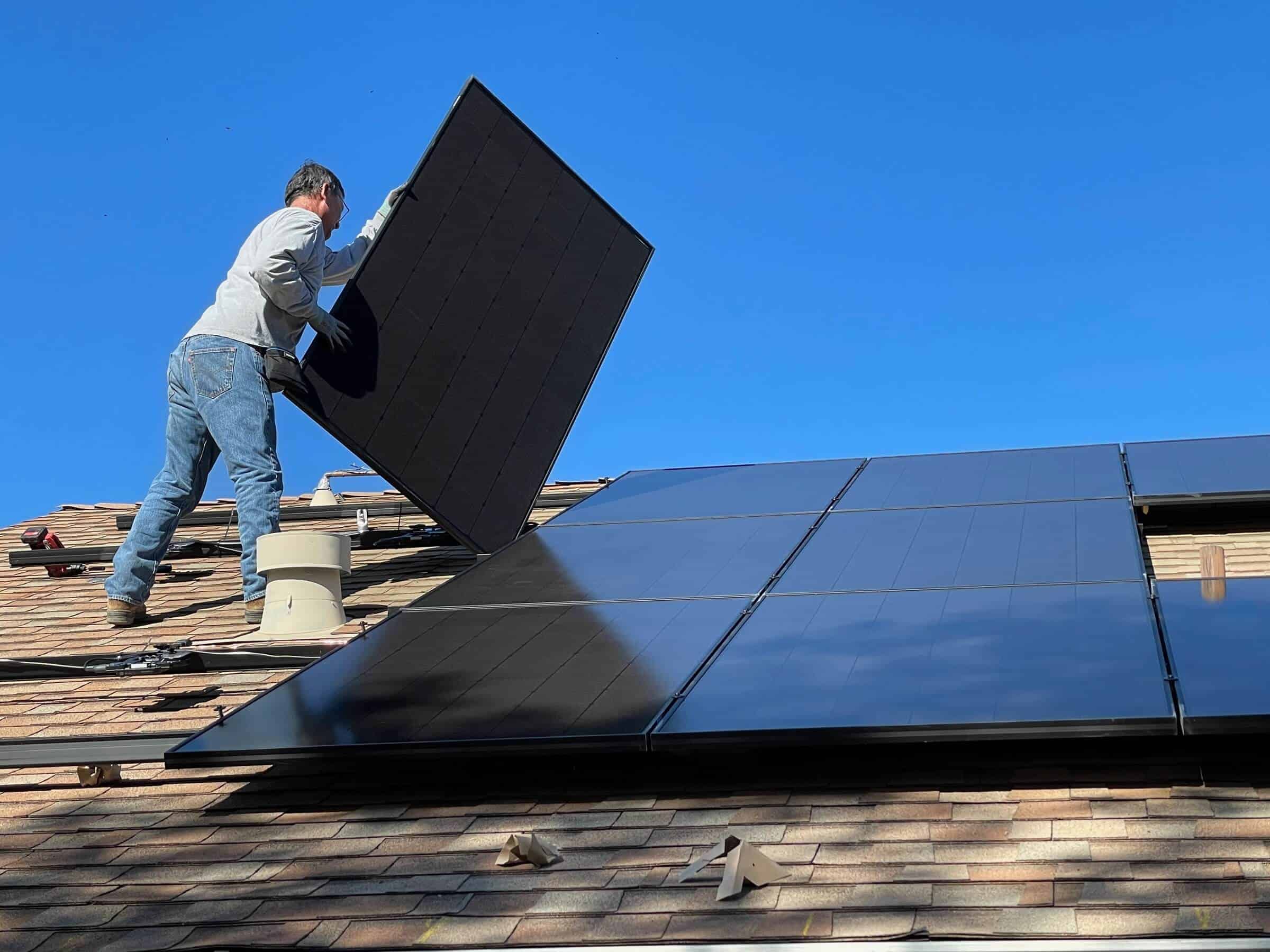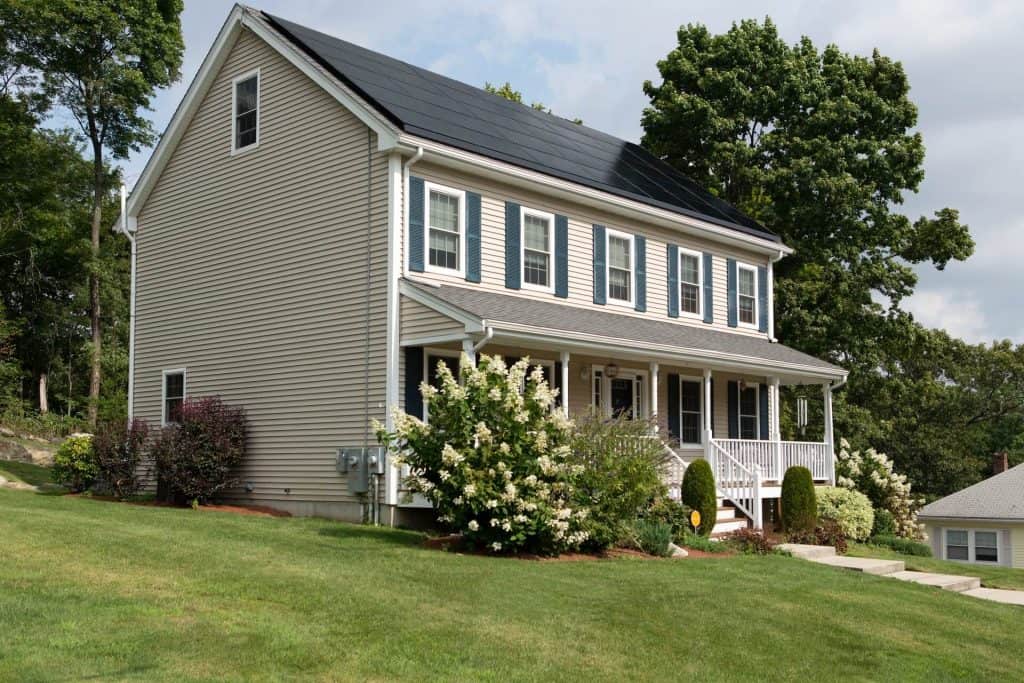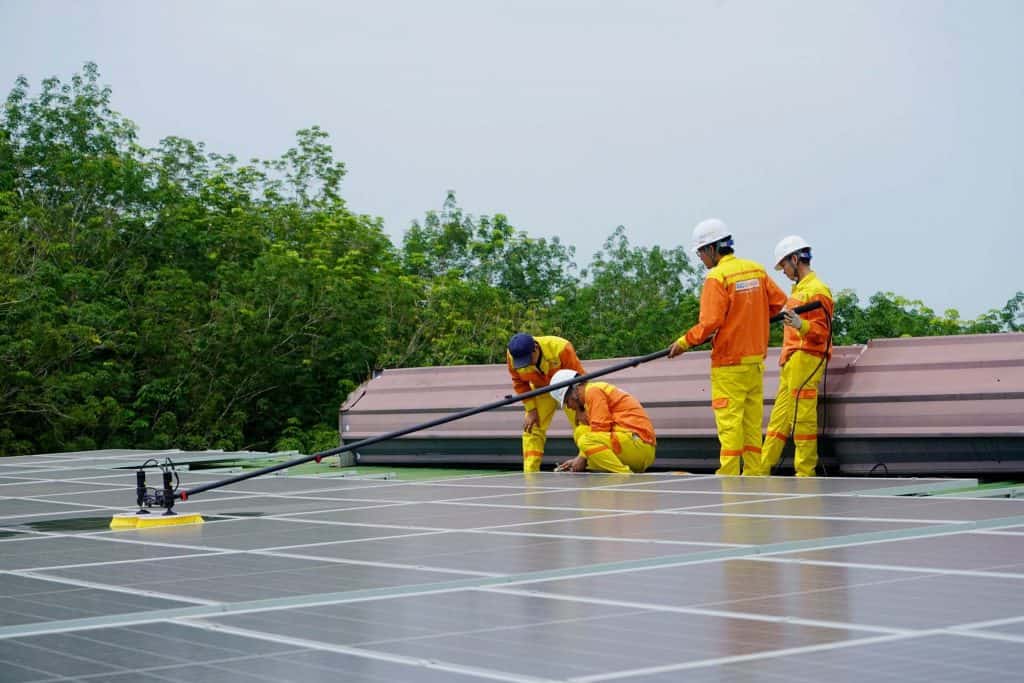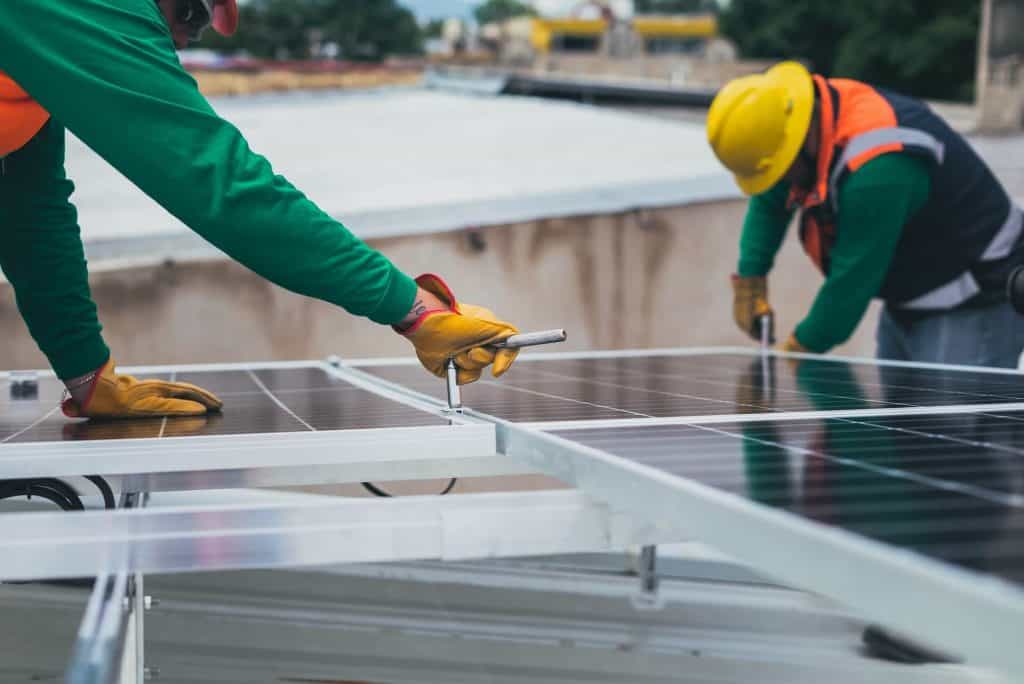How Much Money Can You Save a Year With Solar Panels?

Are you trying to find ways to reduce your annual expenses? Do you want to know how much money can you save a year with solar panels?
You may want to consider investing in solar panels.
Solar energy is a cost-effective and environmentally friendly way to power your home or business.
In this article, we will discuss how much money you can save a year with solar panels.
We will also provide tips on how to get the best return on your investment.
How do solar panels work?
Solar panels are a type of renewable energy source that converts sunlight into electricity.
They are composed of individual solar cells, which are connected to form a unit.
When sunlight hits the solar cells, it causes an electrical reaction that generates a DC current.
This current is then converted into an AC current using an inverter, which can be used to power household appliances and electronics.
Solar panels are typically mounted on rooftops or in open areas where they can receive direct sunlight.
In addition to generating electricity, solar panels can also be used to heat water or air, depending on their application.
Solar panels are becoming an increasingly popular option as the world looks for ways to reduce its reliance on fossil fuels.

The benefits of using solar energy
Solar energy is one of the most efficient and abundant sources of renewable energy available.
Solar panels have many benefits.
Here’s a closer look at some of the solar panel’s advantages in more detail:
Environmentally friendly
Solar energy is not only renewable but also environmentally friendly.
Solar panels do not produce pollutants or greenhouse gases, making them a clean energy source.
In addition, solar energy is a distributed form of energy, meaning that it can be generated in many different locations.
This can help to reduce our reliance on fossil fuels, which are often concentrated in a few politically unstable regions of the world.
Furthermore, solar energy is infinitely renewable—unlike fossil fuels, which will eventually run out.
As our reliance on solar energy increases, we can help create a more sustainable and environmentally friendly future for generations.

Versatile and reliable
Solar energy is increasingly becoming popular for those looking for an environmentally friendly and efficient way to power their homes and businesses.
One of the main reasons for this is that solar energy is very versatile and reliable.
Solar panels can be placed on residential and commercial properties, and they can generate electricity even on cloudy days.
In addition, solar panels have a very long lifespan, so once installed, you can enjoy years of worry-free power.
With solar energy, you can be sure that you are doing your part to protect the environment while reducing your monthly electricity costs.
Low maintenance cost
Solar energy is increasingly becoming a popular choice for powering homes and businesses due to its many benefits.
One key advantage of solar is that it has low maintenance costs.
Once a solar system is installed, there are very few ongoing costs.
The main exception is occasionally cleaning the panels to ensure they are free of dirt and debris.
In contrast, other forms of energy generation, such as coal and natural gas, require constant monitoring and maintenance to operate safely and efficiently.
This makes solar a more appealing option for those looking for an energy source that requires little attention once it is up and running.
Additionally, solar panels have a long lifespan and typically come with lengthy warranties, further adding to their appeal from a financial perspective.
When weighing the pros and cons of different energy options, low maintenance costs should be taken into consideration as they can provide significant long-term savings.

Do solar panels really save you money?
Solar panels are often touted as a way to save money on your energy bill.
But do they really live up to the hype?
The answer depends on many factors, including the size of your home, the climate you live in, and the type of solar panel you choose.
However, installing solar panels can significantly reduce your energy costs.
According to the US Department of Energy, the average household can save up to $600 per year by switching to solar power.
And while the initial cost of installation can be pricey, most solar panels come with a 25-year warranty, meaning they should provide years of savings.
In addition, many states offer tax incentives for homeowners who install solar panels.
So if you’re looking for a way to lower your energy costs, solar power may be worth considering.
- Consider reading: How to save money when you are broke? – 10 tips
What to consider before installing solar panels?
Solar panels are a great way to reduce your reliance on fossil fuels and save money on your energy bill.
However, you should consider a few things before installing solar panels.
One is the upfront cost.
Solar panels can be expensive, so you’ll need to ensure you have the financial resources to cover the initial investment.
You’ll also need to consider the climate where you live.
Solar panels work best in sunny areas, so if you live in a place with a lot of cloud cover, you may not get as much benefit from them as someone who lives in a sunny location.
Finally, you’ll need to consider whether your home is suitable for solar panels.
If trees or other buildings shade your roof, you may not get enough sun exposure to make solar panels worth your while.
However, if your home receives plenty of direct sunlight, solar panels could be an excellent option for reducing your energy costs.

How much money can you save a year with solar panels?
Solar panels are an increasingly popular way to save money on energy costs.
By harnessing the power of the sun, solar panels can produce enough electricity to meet a portion or all of a home’s energy needs.
The amount of money solar panels can save varies depending on many factors, such as the size and efficiency of the system, the amount of sunlight that hits the home, and the local utility rates.
However, solar panels can generally save homeowners hundreds of dollars each year on their energy bills.
| State and city | Cost of kWh in this area | Savings per year in this area | Savings over 25 years in this area | Minimum number of years to pay back for a $17,000 system |
| Mesa, Arizona | $0.13 | $1,808.68 | $45,217 | 10 |
| Tucson, Arizona | $0.13 | $1,800.72 | $45,018 | 10 |
| Phoenix, Arizona | $0.12 | $1,639.08 | $40,977 | 11 |
| Long Beach, California | $0.21 | $2,759.96 | $68,999 | 7 |
| Fresno, California | $0.21 | $2,662.60 | $66,565 | 7 |
| Oakland, California | $0.21 | $2,647.88 | $66,197 | 7 |
| Sacramento, California | $0.21 | $2,614.80 | $65,370 | 7 |
| Los Angeles, California | $0.21 | $2,776.52 | $69,413 | 7 |
| San Diego, California | $0.29> | $3,816.48 | $95,412 | 5 |
| San Jose, California | $0.16 | $1,968.20 | $49,205 | 9 |
| San Francisco, California | $0.24 | $3,147.28 | $78,682 | 6 |
| Denver, Colorado | $0.14 | $1,772.60 | $44,315 | 10 |
| Colorado Springs, Colorado | $0.12 | $1,622.28 | $40,557 | 11 |
| Washington, D.C. | $0.13 | $1,447.08 | $36,177 | 12 |
| Miami, Florida | $0.12 | $1,407.04 | $35,176 | 13 |
| Jacksonville, Florida | $0.12 | $1,297.84 | $32,446 | 14 |
| Atlanta, Georgia | $0.12 | $1,359.80 | $33,995 | 13 |
| Chicago, Illinois | $0.14 | $1,321.80 | $33,045 | 13 |
| Indianapolis, Indiana | $0.09 | $927.68 | $23,192 | 19 |
| Wichita, Kansas | $0.11 | $1,345.60 | $33,640 | 13 |
| Louisville, Kentucky | $0.09 | $969.40 | $24,235 | 19 |
| New Orleans, Louisiana | $0.10 | $1,061.40 | $26,535 | 17 |
| Baltimore, Maryland | $0.12 | $1,335.60 | $33,390 | 13 |
| Boston, Massachusetts | $0.23 | $2,270.12 | $56,753 | 8 |
| Detroit, Michigan | $0.17 | $1,740.40 | $43,510 | 10 |
| Minneapolis, Minnesota | $0.15 | $1,703.64 | $42,591 | 10 |
| Kansas City, Missouri | $0.11 | $1,284.00 | $32,100 | 14 |
| Omaha, Nebraska | $0.11 | $1,310.96 | $32,774 | 13 |
| Las Vegas, Nevada | $0.12 | $1,692.64 | $42,316 | 11 |
| Albuquerque, New Mexico | $0.12 | $1,667.44 | $41,686 | 11 |
| New York City, New York | $0.21 | $2,107.64 | $52,691 | 9 |
| Charlotte, North Carolina | $0.11 | $1,277.28 | $31,932 | 14 |
| Raleigh, North Carolina | $0.11 | $1,304.24 | $32,606 | 13 |
| Columbus, Ohio | $0.13 | $1,279.72 | $31,993 | 14 |
| Tulsa, Oklahoma | $0.08 | $1,033.40 | $25,835 | 17 |
| Oklahoma City, Oklahoma | $0.10 | $1,229.40 | $30,735 | 14 |
| Portland, Oregon | $0.11 | $975.04 | $24,376 | 18 |
| Philadelphia, Pennsylvania | $0.15 | $1,561.88 | $39,047 | 11 |
| Nashville, Tennessee | $0.11 | $1,233.00 | $30,825 | 14 |
| Memphis, Tennessee | $0.10 | $1,125.28 | $28,132 | 14 |
| Dallas, Texas | $0.13 | $1,558.40 | $38,960 | 11 |
| El Paso, Texas | $0.11 | $1,549.00 | $38,742 | 11 |
| Arlington, Texas | $0.11 | $1,305.20 | $32,630 | 13 |
| Austin, Texas | $0.11 | $1,308.08 | $32,702 | 13 |
| Houston, Texas | $0.14 | $1,586.40 | $39,660 | 11 |
| Fort Worth, Texas | $0.11 | $1,370.64 | $34,266 | 13 |
| San Antonio, Texas | $0.09 | $1,062.36 | $26,559 | 17 |
| Virginia Beach, Virginia | $0.11 | $1,291.68 | $32,292 | 13 |
| Seattle, Washington | $0.11 | $908.60 | $22,715 | 19 |
| Milwaukee, Wisconsin | $0.14 | $1,342.64 | $33,566 | 13 |
This is an approximation.
In addition, solar panels have a relatively long lifespan and require very little maintenance, making them a smart investment for any homeowner looking to save money in the long term.
How long does it take for solar panels to pay for themselves?
Solar panels are a big investment, but they can save you money in the long run by reducing your dependence on grid electricity.
The average solar panel payback period is about 7-10 years.
This means that it will take about 7-10 years for your solar panels to “pay for themselves” by offsetting the original investment cost.
After that, you’ll start saving money on your energy bill each year.
Of course, the payback period will vary depending on how much you pay for your solar panel system, how much sun your location gets, and how much electricity you use.
But even in cloudy locations or when used sparingly, solar panels can still save you money over time.
And, of course, solar panels also have the added benefit of being good for the environment!
So if you’re considering switching to solar power, rest assured that it’s a smart investment that will pay off eventually – both financially and environmentally.
- Consider reading: How to set a saving goal that works for you?

What affects cost savings with solar panels?
The cost of installing solar panels has dropped significantly recently, making it a more attractive option for homeowners and businesses looking to reduce their energy costs.
However, many factors can affect the overall cost savings solar panels provide.
The most crucial factor is the amount of sunlight the panels will be exposed to.
Solar panels need direct sunlight to generate electricity, so locations with more sun exposure will typically see greater cost savings.
The angle of the sun’s rays can also affect the amount of electricity generated, so locations closer to the equator will generally see higher production levels.
The size and orientation of the solar panels are also important factors to consider, as larger panels and those facing south typically produce more electricity.
Finally, the type of solar panel can also affect costs and production levels.
Monocrystalline silicon panels are typically more efficient than their polycrystalline counterparts, but they also tend to be more expensive.
As a result, it is important to consider all of these factors when evaluating the cost savings solar panels can provide.
- Consider reading: 8 Tips to save money without sacrificing your lifestyle
How to find a reputable solar panel installer?
Going solar is a big decision that can save money and help the environment.
But before you make the switch, it’s important to find a reputable solar panel installer who can help you choose the right system and ensure it’s appropriately installed.
Here are a few tips to get you started:
- Do some research. The first step is to educate yourself about solar energy and the different types of systems available. Once you have a basic understanding, you can narrow your list of potential installers.
- Get referrals. Talk to friends, family, and neighbors who have gone solar and see who they used. You can also check online reviews to understand customer satisfaction levels.
- Ask for credentials. Any reputable installer should be able to provide proof of their licensing and insurance. This will give you peace of mind that they’re qualified to do the job.
- Get multiple quotes. Once you’ve found a few potential installers, get written proposals from each one outlining the cost and scope of the project. This will help you compare apples to apples and choose the best option for your needs.
By following these tips, you can be sure to find a reputable solar panel installer who will do a great job on your home.

How much money can you save a year with solar panels? – Conclusion
Have you considered going solar?
Although solar panels may seem like a big investment initially, they’re a great way to save money on your energy bill and simultaneously help the environment.
With solar panels, you can generate electricity and potentially save thousands of dollars over the system’s life.
But before you make the switch, it’s important to do your research and find a reputable installer who can help you choose the right system for your needs.






